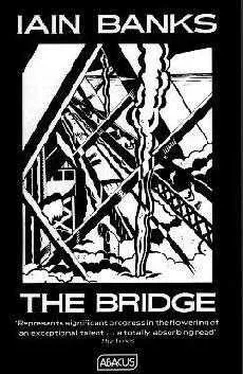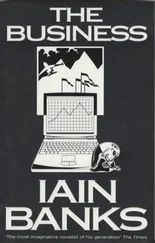I think about this, then nod. 'Yep, fair enough doc, you're right.'
In the outer office, the doctor's ghastly receptionist helps me on with my coat (he has brushed it while I was in with the doctor).
'Well Mr Orr, and how did it go today? Well I hope. Yes?'
'Very well. Considerable progress. Great strides. Meaningful discussion.'
'Oh that does sound encouraging!'
'Literally incredible.'
I take one of the grand main elevators down from the hospital complex to street level above the train deck. In the great lift, surrounded by thick rugs, tinkling chandeliers and gleaming brasswork framing polished mahogany, I take a glass of cappuccino from the bar and sit down to watch the resident string quartet, framed against the outer windows of the huge, slowly descending room.
Behind me, round an oval table inside a roped-off rectangle, twenty or so bureaucrats and their aides are discussing a convoluted point of order which has cropped up during their meeting, which - according to a placard on a small stand just inside the roped-off area - concerns the standardisation of contract specifications in invitations-to-tender for locomotive high-speed bunkering channels (coal dust type, fire prevention in).
From the elevator to an open street above the main train deck; this is an avenue of walk- and cycle-way, metal-decked, which forges a comparatively straight path through both the bridge's own structure and the chaotically unplanned additions of shops, cafes and kiosks which clutter this bustling level.
The street - rather grandly called the Boulevard Queen Margaret - lies near the outer edge of the bridge; its inside buildings form part of the lower edge of the ziggurat of secondary architecture piled inside the original framework. Its outer-edge buildings abut the main girders themselves, and in intermittent gaps offer views of the sea and sky.
Long and narrow, the street makes me think of ancient towns, where haphazardly thrown together buildings jutted out towards each other, tilting over and enclosing both the thoroughfares themselves and the swarming crowds they contained. The scene here is not so different; people jostling, walking, bicycling, pushing prams, hauling carts, carrying sedan chairs, straining on trike-vans, chattering in their various languages, dressed in civilian clothes or uniforms, and forming a dense mass of confused motion where people flow in both directions at once, and across the main stream as well, like blood cells in an artery gone mad.
I stand on the raised platform outside the elevator halt.
Over the noise of the milling people, the continual hisses and clanks, grindings and gratings, klaxons and whistles of the trains on the deck beneath sound like shrieks from some mechanistic underworld, while every now and again a deep rumble and a still more profound quaking and rattling announces a heavy train passing somewhere below; great pulsing clouds of white steam roll around the street and upwards.
Above, where the sky ought to be, are the distant, hazily seen girders of the high bridge; obscured by the rising fumes and vapours, dimmed by the light intercepted outside them by their carapace of people-infected rooms and offices, they rise above and look down upon the rude profanity of these afterthought constructions with all the majesty and splendour of a great cathedral roof.
A frenzied chorus of beeping swells from one side; a black rickshaw pulled by a young boy rushes through the crowds, which part for it. It is an engineer's cab. Only important officials and couriers of the major guilds are allowed to use rickshaws; merely well-off people are permitted to use sedan chairs, though in practice few do because elevators and trams are quicker. The only other alternative is to cycle, though as wheels are taxed on the bridge, the only affordable conveyance of this type for most people is a monocycle. Accidents are common.
The fusilade of honking which precedes the cab emanates from the uniformed rickshaw-boy's feet; in the heel of each of his shoes there is a small horn; people know the sound and are warned.
I repair to a cafe to think about what I shall do after lunch. I might go swimming - there is a very pleasant, uncrowded pool a couple of levels down from my apartment - or I might phone my friend Brooke, the engineer; he and his cronies usually play cards in the afternoon when they can't think of anything better to do, or I might take a local tram and go in search of new galleries: I haven't bought any paintings for a week or so.
A pleasant tingle of anticipation runs through me as I contemplate these various agreeable ways of spending my time. I leave the cafe after a coffee and liqueur and rejoin the busy press of people.
I throw a coin from the tram I take back to my own section of the bridge as we cross the narrow linking span. It is traditional to throw things from the bridge, for luck.
Night. A pleasant evening behind me spent swimming, dining at the rackets club, then taking a stroll down at the harbour. I am a little tired, but watching the tall yachts bobbing quietly in their dark marina has given me an idea.
I stretch out on the chaise-longue in my sitting room and consider the exact form my next dream for the good doctor ought to take.
Decided, I prepare my writing table, then go to the television screen built into the wall behind where I will sit; I work better with it on, talking quietly to itself. Most of the programmes are dross, intended for the unthinking - quiz shows, soap operas, and so on - but I watch occasionally, ever in hope of seeing something which is not the bridge. I find a channel still broadcasting - a play, apparently set in a mining community on one of the small islands - and turn the dialogue down to a murmur, loud enough to hear but not make out. I take my place at my desk, pick up my pen. The television starts to hiss. I turn round. A grey haze fills the screen, white noise issues from the speaker. Perhaps the set is faulty. I go to turn it off, but then a picture appears. There is no sound; the hiss has gone.
The screen shows a man lying in a hospital bed, surrounded by machines. It is in black and white, not colour, and grainy. I turn up the sound, but only a very gentle hiss emerges even at maximum volume. The man in the bed has tubes and pipes appearing from his nose and mouth and arm; his eyes are closed. I can't see him breathe, but he must still be alive. On every channel the picture stays the same: still the man, the bed, the surrounding machines.
The camera looks down and across at the bed; it shows part of a wall, and a small unoccupied seat at one side of the bed. The fellow looks at death's door; even in monochrome his face is terribly pale, and his thin hands - lying motionless on the white bedsheet, one with a tube attached at the wrist - are almost transparent. His face is thin and battered as though he's been in a bad fight. His hair looks mousy; a small bald patch sits on the crown of his head. On the whole, a rather short, grey, ordinary-looking man.
Poor devil. I try changing channels again, but the picture remains. Perhaps I have a crossed line with one of the hospital cameras used to monitor very ill patients. I'll call the repair people in the morning. I look at the still, silent picture for a little while longer, then switch the set off.
Back to my desk. I have to prepare my next dream for the good doctor, after all. I write for a while, but the lack of background noise is vexing, and I have an odd feeling, sitting with my back to the dead television. I take my pen and papers to bed and complete my next dream there, before falling asleep, where - if I do dream - I don't remember dreaming.
Anyway, this is what I write:
All day we had fought, under a topaz sky which slowly clouded over as though obscured by the smoke from our guns and the spreading fires below. The clouds turned dark red with the sunset; beneath our feet the decks were slick with blood. Still we fought, desperate now, though the light was going and our numbers were but a quarter of what they had been; the dead and dying lay thrown about like splinters, our proud ship's paint and goldleaf were blackened and burned, our masts were felled, and our sails - once puffed out bright and decorated as any military chest - now hung like half-burned rags from the mast-stumps, or covered the debris-littered decks where fires burned and dying men moaned. Our officers were dead, our boats were burned or smashed.
Читать дальше












